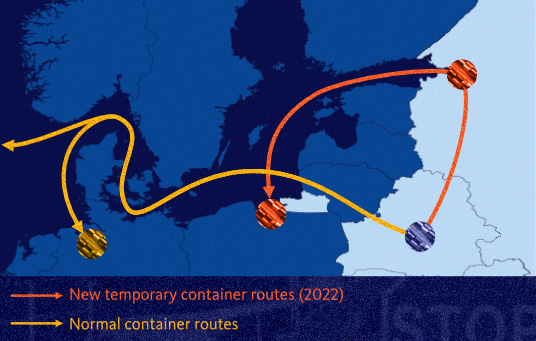Policing sanctioned goods

Following Russia's invasion of Ukraine and the adoption of several subsequent sanctions packages, OLAF has been monitoring the situation, performing analytical work to identify possible fraudulent circumvention of the sanctions. OLAF's extensive expertise in data analysis allows its experts to detect possibly fraudulent behaviour by examining patterns of trade and unusual movements of goods as well as price anomalies and other irregular behaviour at the level of individual operators. This allows OLAF to be proactive and react quickly to new and emerging trends.
The following diagram is a practical example of such an instance from an operator in Minsk (Belarus) which changed their normal route to deliver goods in an attempt to bypass sanctions constraints. The new routes immediately raised suspicions with OLAF as they went via St. Petersburg, thereby adding significant freight costs for the operator. Suspicions were further raised when the operator changed their entry point into the EU, from Bremen to Gdansk. From experience, OLAF knew that the change of an entry point into the EU might be used to conceal the true origin or the nature of the products.

By working in close cooperation with partners in Member States and third countries, OLAF identified and shut off this new route into the EU. Likewise, by working closely with national authorities and competent authorities in Member States and third countries, OLAF managed to stop sanctioned goods from entering the EU, thereby aiding the Russian war machine.
OLAF’s work continues in this area. OLAF has already opened several cases where it either coordinates operational activities or carries out investigative activities. Some of these cases concern imports of sanctioned goods into the EU. OLAF has also been closely monitoring the situation of EU exports of prohibited goods. OLAF can provide operational support in cases of possible sanction circumvention via third countries, notably by acquiring the necessary information by means of mutual assistance requests sent to these countries based on information collected from Member States. Moreover, OLAF can organise joint missions of administrative cooperation with the authorities of the third country and with participation of representatives of Member States in order to obtain evidence of circumvention. The experience of many years of building relationship with customs and trade authorities in third countries, in particular with regard to cases involving circumvention of origin, makes OLAF a recognised, trusted and respected operational partner for those authorities.
Ukraine
Ukraine remains an important hub both for smuggling of tobacco products into the EU and illicit production for both domestic markets and abroad. OLAF’s case work included several irregularities in cross-border trade of cigarettes, non-tobacco materials, machinery and water pipe tobacco.
For example, in March 2022 a suspicious transit declaration for a cigarette packaging machinery shipped from Serbia to a company in Odessa, Ukraine, was identified. Only a few days following its export from the EU into Ukraine a declaration for its re-entry was noticed. The value of the machinery declared upon re-entering the EU was declared to be much lower compared to the initial import declaration. The goods were not presented at an EU customs office within the prescribed time limit and an enquiry procedure was initiated to recover evaded duties. OLAF’s enquiries revealed that the machinery had been imported by a company that could be attributed to one of the key suspects in an ongoing criminal investigation by the Member States. About three months later the machinery was found during a raid of an illicit production site.
Moreover, irregularities were identified for numerous consignments of cigarettes and water pipe tobacco transiting the EU with Ukraine as final destination. Whilst physical checks of the declared goods at the EU exit point confirmed the presence of the goods, no corresponding customs declaration were filed upon entering Ukraine. The trucks were either declared empty or no record of their entry into Ukraine was available.
A similar modus operandi has been observed in cases concerning shipments of refrigerant gases. Numerous transit or re-export operations with alleged destination Ukraine revealed irregularities on both sides of the EU border, obscuring the illegal marketing of the refrigerant gases.
